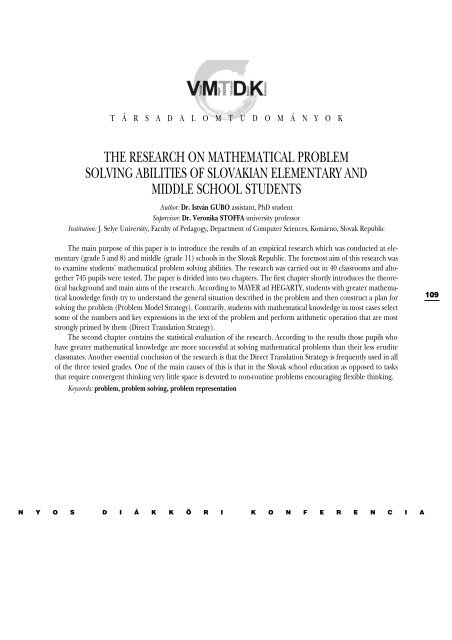Rezümékötet 2008. - vmtdk
Rezümékötet 2008. - vmtdk
Rezümékötet 2008. - vmtdk
Create successful ePaper yourself
Turn your PDF publications into a flip-book with our unique Google optimized e-Paper software.
T Á R S A D A L O M T U D O M Á N Y O K<br />
THE RESEARCH ON MATHEMATICAL PROBLEM<br />
SOLVING ABILITIES OF SLOVAKIAN ELEMENTARY AND<br />
MIDDLE SCHOOL STUDENTS<br />
Author: Dr. István GUBO assistant, PhD student<br />
Supervisor: Dr. Veronika STOFFA university professor<br />
Institution: J. Selye University, Faculty of Pedagogy, Department of Computer Sciences, Komárno, Slovak Republic<br />
The main purpose of this paper is to introduce the results of an empirical research which was conducted at elementary<br />
(grade 5 and 8) and middle (grade 11) schools in the Slovak Republic. The foremost aim of this research was<br />
to examine students’ mathematical problem solving abilities. The research was carried out in 40 classrooms and altogether<br />
745 pupils were tested. The paper is divided into two chapters. The first chapter shortly introduces the theoretical<br />
background and main aims of the research. According to MAYER ad HEGARTY, students with greater mathematical<br />
knowledge firstly try to understand the general situation described in the problem and then construct a plan for<br />
solving the problem (Problem Model Strategy). Contrarily, students with mathematical knowledge in most cases select<br />
some of the numbers and key expressions in the text of the problem and perform arithmetic operation that are most<br />
strongly primed by them (Direct Translation Strategy).<br />
The second chapter contains the statistical evaluation of the research. According to the results those pupils who<br />
have greater mathematical knowledge are more successful at solving mathematical problems than their less erudite<br />
classmates. Another essential conclusion of the research is that the Direct Translation Strategy is frequently used in all<br />
of the three tested grades. One of the main causes of this is that in the Slovak school education as opposed to tasks<br />
that require convergent thinking very little space is devoted to non-routine problems encouraging flexible thinking.<br />
Keywords: problem, problem solving, problem representation<br />
N Y O S D I Á K K Ö R I K O N F E R E N C I A<br />
109




